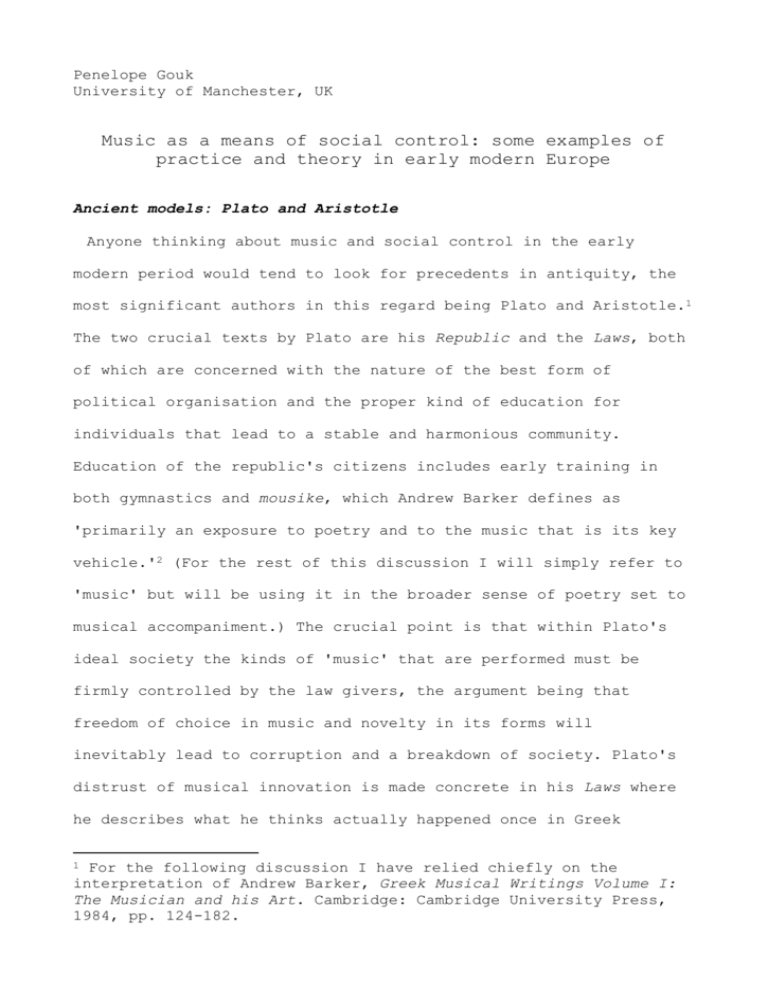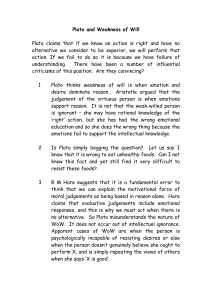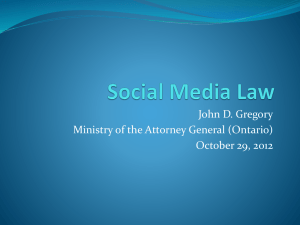Penelope Gouk
advertisement

Penelope Gouk University of Manchester, UK Music as a means of social control: some examples of practice and theory in early modern Europe Ancient models: Plato and Aristotle Anyone thinking about music and social control in the early modern period would tend to look for precedents in antiquity, the most significant authors in this regard being Plato and Aristotle.1 The two crucial texts by Plato are his Republic and the Laws, both of which are concerned with the nature of the best form of political organisation and the proper kind of education for individuals that lead to a stable and harmonious community. Education of the republic's citizens includes early training in both gymnastics and mousike, which Andrew Barker defines as 'primarily an exposure to poetry and to the music that is its key vehicle.'2 (For the rest of this discussion I will simply refer to 'music' but will be using it in the broader sense of poetry set to musical accompaniment.) The crucial point is that within Plato's ideal society the kinds of 'music' that are performed must be firmly controlled by the law givers, the argument being that freedom of choice in music and novelty in its forms will inevitably lead to corruption and a breakdown of society. Plato's distrust of musical innovation is made concrete in his Laws where he describes what he thinks actually happened once in Greek For the following discussion I have relied chiefly on the interpretation of Andrew Barker, Greek Musical Writings Volume I: The Musician and his Art. Cambridge: Cambridge University Press, 1984, pp. 124-182. 1 society, namely that the masses had the effrontery to suppose they were capable of judging music themselves, the result being that 'from a starting point in music, everyone came to believe in their own wisdom about everything, and to reject the law, and liberty followed immediately'.3 (To Plato liberty is anathema since some people have much greater understanding and knowledge than others.) This close association between the laws of music and laws of the state exists because according to Plato music imitates character, and has a direct effect on the soul which itself is a harmonia, the consequence being that bad music results in bad citizens. To achieve a good state some form of regulation must take place, the assumption being that if the right musical rules are correctly followed this will result in citizens of good character. It is fascinating to discover that Plato looks to Egypt with approval for its drastic control of music in society, claiming that its forms had remained unchanged for ten thousand years because of strict regulation that 'dedicated all dancing and all melodies to religion'.4 To prescribe melodies that possessed a 'natural correctness' he thinks 'would be a task for a god, or a godlike man, just as in Egypt they say that the melodies that have been preserved for this great period of time were the compositions of Isis.'5 (In fact as we shall see there were similar arguments made for the divine origins of sacred music in the Hebrew tradition.) Perhaps thinking himself to be a 'godlike man', Plato 2 3 4 5 Quoted from Barker vol. 1 p.127. Laws 701a. Laws 799a. Laws 657a. 2 lays down a series of strict rules governing musical composition and performance, a prescription that if correctly followed would ensure the virtue of citizens and the stability of the state, as well as the banishment of most professional musicians from society. First, Plato wants to limit the kind of poetry that is set to music at all because songs have such a direct and powerful effect on people's morals. Thus any poems that portray wickedness, immorality, mourning or weakness of any kind must be banned, leaving only music that encourages good and courageous behaviour among citizens. The next thing to be curtailed is the range of musical styles allowed in the city, which Plato would confine to the Dorian and the Phrygian 'harmoniai', a technical term for organisations of musical pitch that for the purposes of this paper need not be discussed in any more detail. Between them these two 'harmoniai' appropriately 'imitate the sounds of the selfrestrained and the brave man, each of them both in good fortune and bad.'6 Thirdly, as well as controlling the words to be sung and the manner in which they are performed, Plato would also regulate the kinds of instrument used for accompaniment, the two most important being the lyra and the kithara. Those that are forbidden include the aulos as well as a range of multi-stringed instruments capable of playing in a variety of different modes. Finally, Plato is emphatic in stating that the metrical foot and the melody must follow the words properly for the right effect to be achieved, Ibid., p. 131. The relevant passage in the Republic is 397-401b. In fact Plato was unique in describing the Phrygian harmonia as 6 3 rather than the other way around. Of course these rules are intrinsically interesting, since they tell us about what Plato thought was wrong with music of his own time. However, for my purposes they are also interesting because they seem to have had a discernable influence on would-be reformers of music and society in the early modern period (that is, between the sixteenth and eighteenth centuries) which I will come to further on in my paper. Turning now to Aristotle, we find that his views on the educational and social aspects of music are found in a substantial passage at the end of the Politics. Although equally interested in the stability of the state, Aristotle is far less uncompromising than Plato in his view of music. He accepts that 'music is capable of creating a particular quality of character in the soul'7 but instead of excluding everything except morally improving music he suggests that a wider range of musical styles can be enjoyed in the regulated context of leisured entertainment, either by listening to professionals or engaging in performance oneself—at least to a limited extent. Learning music can form part of a liberal education, as long as students are not taught the spectacular technical practices of professionals that would enable them to participate in professional contests. Instead they should be taught the moral harmoniai (especially the Dorian) while the other harmoniai that are more invigorating and inspirational can be listened to in the pursuit of relaxation and harmless pleasure. In sum, Aristotle acknowledges music's affective power but thinks morally upright, most authorities associated it with frenzy. 7 Politics 1338a9-37. 4 if it is properly contained in the form of public or private entertainment it is not likely to be damaging either to the individual or to society as a whole. Again, just as I suggested that we can see the influence of Plato's views on music on some early modern thinkers, so we can find similar attention to Aristotle's support of properly controlled musical practice. However, before considering how these classical authorities were interpreted in early modern times, it should be noted that the Bible, specifically the Old Testament, also offered a window onto ancient musical and legislative practices. In particular we should note that early modern thinkers believed that King David, the charismatic leader of the Israelites, was inspired by the Holy Spirit not only to sing God's praises through voice and harp in the form of psalms but also to communicate divine laws to His (i.e. God's) chosen people. A similar unity between the law and song was also thought to be found among the Celts in ancient British and Gallic societies, a context in which the druids apparently played a leading role as guardians of customary law. In short, early modern authors knew from their interpretations of ancient texts that some ancient communicative practices involving a fusion of music and poetry seemed to be much more emotionally powerful than anything in modern times. The Renaissance belief that some things were much better in antiquity than in the present day was a commonly held viewpoint even into the Enlightenment, as we shall see later in my presentation. 5 Music and social control in sixteenth-century France The context in which my first historical example of music being recognised as a means of controlling society arises is France in the 1570s, a time which according to Frances Yates was 'the darkest period of the struggle between Catholic and Huguenot', an episode in a bloody and protracted conflict known as the French Wars of Religion (1562-1598).8 In brief, between around 1540 and 1570 the Huguenots had effectively created a powerful new religious identity amongst communities of believers in Paris, Lyon and other major cities across France (as well as Geneva of course, which remained the epicentre of Calvinist teaching long after Calvin's death in 1564). This success was in no small measure due to the practice of communally singing psalms in public, a sound that became unequivocally associated with a Protestant way of life. Psalms were a means through which Huguenots sustained themselves in the face of persecution, and attracted new converts to the Protestant cause.9 It was Calvin who was chiefly responsible for this development, since he regarded the psalms as the ideal instrument for restoring to Christianity the authentic and unadulterated worship of the ancient church. (This is one of the most important contexts in which the example of King David's rule of the Israelites and his creation of the psalms played a central role). Calvin published his first psalter in 1539 and supported an Frances Amelia Yates, The French Academies of the Sixteenth Century. London: Warburg Institute, 1947, p. 69. 9 Barbara B. Diefendorf, "The Huguenot psalter and the faith of French Protestants in the sixteenth century." Culture and identity in early modern Europe (1500-1800): essays in honour of Natalie Zemon Davis. Eds. Barbara B. Diefendorf and C. Hesse. Ann 8 6 initiative to produce a complete edition of the psalms set to simple melodies that was first published at Geneva in 1562, from whence some 27,400 copies were distributed across Europe. Thereafter thousands of copies continued to be issued at every major centre of the Protestant book trade.10 It is against this background that we can see the sense of the French king Henri II in banning public singing of psalms in 1558 because they had achieved the status of insurrectionary hymns. By way of countering these practices Catholics became accustomed to sing the Te Deum to celebrate local victories of their own. The danger posed to the status quo by psalm singing can be shown with particular reference to Lyon, which was a nexus of tensions between a Catholic majority and Huguenot minority during this period. In Lyon in 1564 a royal ordinance of Charles IX made the singing of 'dissolute songs' punishable by death, an action that was originally directed against Huguenot psalms, but soon came to have a wider application. In these early days of print culture the oral tradition of singing and crying the news elaborated in print was also a potentially disruptive force. As Kate van Orden puts it, 'Through the expulsion or execution of vagrants, gamblers and blasphemers, Charles IX hoped to cleanse the body politic in a process that emphasizes song as a transmitter of social disease Arbor: University of Michigan Press, 1993. 41-63. 10 Penelope Gouk, "Harmony, health and healing: music's role in early modern Paracelsian thought." The practice of reform in health, medicine and science, 1500-2000; essays for Charles Webster. Eds. Margaret Pelling and Scott Mandelbrote. Aldershot: Ashgate, 2005. 23-42. 7 and religious unrest'.11 Even as Charles IX attempted to control public order with antimusical legislation, he was also receptive to the possibility of the creation of new music that would bring back into use "both the kind of poetry and the measure and rule of music anciently used by the Greeks and Romans".12 This lofty goal was presented to the king in 1570, in the form of a request made to the Privy Council by two men who had already spent several years experimenting with a form of poetry set to music that supposedly emulated ancient techniques of metrical composition, while using the modern French language. In 1570 Jean-Anton de Baïf and Joachim Thibault de Courville were successful in establishing the first publicly instituted academy in France, the Académie de poésie et de musique complete with its statutes and royal letters patent which outlined its broader aspirations as well as the details of day-to-day running and administration. As Charles IX or his officials observed in the Letters Patent of the Academy, it was "the opinion of many great personages, both ancient legislators and philosophers ... that it is of great importance for the morals of the citizens of a town that the music current and used in the country should be retained under certain laws, for the minds of most men are Kate van Orden,"Cheap print and street songs following the St Bartholomew's massacres of 1572." Music and the cultures of print. Ed. Kate van Orden. New York and London: Garland, 2000. 271-323 (p. 275). 12 Request for founding an Academy by Jean-Anton de Baïf and Joachim Thibault de Courville quoted by Frances Yates, The French Academies, p 21. 11 8 formed and their behaviour influenced by its character, so that where music is disordered, there morals are also depraved, and where it is well ordered, there men are well disciplined morally."13 The formalisation of Baïf's academy was not just intended to support poets and composers collaborating on new music, but was also planned to be part of a broader emulation of the ancient Greek academies where the study of philosophy and the arts was part of the education of the political elite, the ideal model, of course, being Plato's Republic. The Academy had two classes of members, the 'honest auditors' who were responsible for subsidising composition and performance of the measured music, and the professional composers, singers and players who were supported by this patronage. Baïf's larger aim was to create a new kind of song comparable to those used by Orpheus and the Gallic bards to establish law in their respective societies.14 Once created, this music was to be imposed on citizens to regulate their behaviour. It would banish disorder and restore health to the social body, and at the same time the minds of auditors would 'be composed so as to become capable of the highest knowledge after being purged of the remnants of barbarism'.15 Quoted in Yates, French Academies, p. 23 and in Appendix 1, p. 319. 14 D. P. Walker, "The Aims of Baif's Académie de Poésie et de Musique." Journal of Renaissance and Baroque Music 1 (1946): 91100. 15 Yates, French Academies, p. 23 and in Appendix 1, p. 320. 13 9 Scottish Enlightenment theories of music and the body politic These late sixteenth-century French examples of musical legislation leave us no doubt that 'music' (i.e. especially verses set to music) was already assumed at this time to have a powerful effect on the passions. What is distinctively lacking in the 1570s, however, is a fully worked-out doctrine of affections underpinned by a physiological model that could account for transformations in the human psyche. With hindsight we know that such discourses were developed during the seventeenth and early eighteenth centuries, a period when composers increasingly sought to develop a musical language of the passions that would strongly move their auditors. With these transformations in mind I now propose to turn to the writings of a mid-eighteenth century Scottish physician and amateur musician, whose belief in the need for the right kind of music in polite society distinctly parallels Baïf's conviction in this matter. Dr John Gregory expressed his views on music in a lecture given to the Aberdeen Philosophical Society in 1763, which he published in his Comparative view of the state and faculties of man (Edinburgh, 1765) nearly two hundred years after Baïf's musical experiments in Paris.16 This lecture shows us that Gregory, although neither a poet nor a composer himself, regarded music as a potentially powerful vehicle for self-improvement and social The following section is based on Penelope Gouk, "Music's pathological and therapeutic effects on the body politic: Doctor John Gregory's views." Representing emotions: new connections in the histories of art, music and medicine. Eds. Penelope Gouk and Helen Hills. Aldershot: Ashgate, 2005. 191-207. 16 10 integration, a view that seems to chime with his own educational experience in Scotland and the Netherlands as a young medical student. In contrast to the turbulent times in which Baïf lived, Gregory's age was comparatively peaceable, with Lowland Scotland enjoying an unparalleled period of prosperity and expanding artistic culture.17 The thrust of Gregory's lecture is that music ought to play a more important role in social and personal development than it does at present, but in order for this to happen philosophers rather than professional musicians will have to be responsible for directing musical style, and indeed all the elegant arts. Significantly, Gregory finds a model for this improvement in ancient Greece, in a period when music was taken seriously by its ruling classes. He notes that the laws and maxims of the early Greek states were written in verse, and 'melody and poetry was the established vehicle of all the leading principles of religion, morals and polity'.18 Indeed, Gregory stresses that bards like Orpheus were not only important figures in Greece but in other early periods of all civilized nations, notably among the Celts in Great Britain. Through the combination of powerful words and instrumental accompaniment, they moved the hearts and minds of their peoples towards right action. This power to regulate a society's passions represented a high point in civilization, the Not forgetting the failed Jacobite rising in 1745. See David Johnson, Music and Society in Lowland Scotland in the Eighteenth Century. London, 1972. 18 John Gregory, A Comparative View of the State and Faculties of Man with those of the Animal World. 3rd ed. Edinburgh, 1788, p. 144. 17 11 assumption being that societies lacking such music were more primitive and their people emotionally underdeveloped. However, Gregory notes that as Greek society became increasingly cultivated the use of music for mere entertainment made it an unsuitable skill for any man of high rank and character, and the power and dignity of music sank 'into general corruption and contempt'.19 Drawing a parallel with his own times, Gregory suggests that unchecked cultivation of music for its own sake undermines the moral health of a society, the solution being to strike a proper balance between the extremes of primitivism and decadence, a process that requires careful regulation. Gregory's historical theories about music's role in social development are closely intertwined with his theories of individual neurological and psychological development, which are found in the medical lectures he gave as Professor of Medicine at the University of Edinburgh between 1765 and his death in 1773. Gregory's lectures reflect the prevailing view of physicians at this time, namely that good health depends on the state of people's nerves, which need to possess a proper degree of excitation (i.e. sensibility) to develop and also to remain healthy.20 This theory assumes that the central nervous system provides an anatomical basis for the integration of all bodily functions and for the communication of feeling between different bodily organs, known as 'sympathy'. The mind's interaction with Ibid., p. 151. Christopher Lawrence, "The nervous system and society in the Scottish Enlightenment." The Natural Order. Eds. Barry Barnes and Steven Shapin. London, 1979. 19-40. 19 20 12 the body relies on an extremely fine material substance or nervous energy which flows through the nerves, which most physicians including Gregory conceptualised as a network of hollow tubes continuous with the brain and spinal medulla. Gregory thinks that music should be fundamental to children's education, since it is one of the means whereby the nerves acquire a proper degree of sensibility through the regular impressions it makes on the auditory nerve. Boys as well as girls should be musically educated since this can help produce 'men of feeling' capable of influencing moral action in themselves and other people. Simple melodies are the most effective means of commanding the passions, but Gregory also points out that music can lead to a higher kind of pleasure arising from the cultivation of judgement and the intellect, rather than mere sensory gratification. The danger, however (and this takes us back to medicine again), is that 'when one practises music much, the simplicity of melody tires the ear'.21 This leads to the desire for variety and complexity, a condition that despite being essential for high standards of taste and performance eventually leads to weak nerves because there is too much stimulation from the kind of music which meets these exacting criteria, or indeed even simply too much music. Gregory believes that this condition of 'weak nerves'—the basis of almost all diseases of civilization—typically affects women, who are more prone to emotion, and also the rich, because their lifestyle encourages intemperance of all kinds. Excessive 21 Ibid., p. 181. 13 sensibility leads not only to nervous disorders like melancholia, hysteria and hypochondria, but also to diseases like smallpox and syphilis, which Gregory associates with luxury. This pathology reflects a widespread contemporary anxiety about the moral dangers that arise from the desires of a successful commercial society. Indeed, although there was a conflict of opinion about music's overall purpose and value among the intellectual elite, Gregory's assumption that there is a correspondence between musical, emotional and social states, and the central role of the nerves in effecting this linkage, proves to be an integral part of Enlightenment medical orthodoxy. Conclusions This brief summary has only begun to touch on the fascinating subject of music and the social control of emotions (or passions and affections). I would especially have liked enough time to talk about some modern attempts to modify feelings and behaviour in particular social settings: for example the current use of piped Mozart to prevent teenage louts hanging around in bus shelters and metro stations, as well as the notorious literary counter-example of Anthony Burgess's Clockwork Orange in which the hero Alex makes a positive association between Beethoven's Ninth Symphony and acts of extreme violence. Equally interesting would be a discussion of Stalin's attempts to make composers create inspirational music for comrades in Soviet Russia, or what impact listening to music on Sony Walkmen and more recently Ipods have made on the collective Western psyche. However, by discussing theory and practice in two 14 very different times and places I hope to have drawn attention to some common themes that seem to recur in discourses on music's power to affect both individual and collective action, at least in the early modern period. One of these themes is a sense of corruption associated with certain kinds of modern music, and their potentially detrimental effects on society. Both Baïf and Gregory appear to think that something is lacking in present day musical practice, or put another way they think that it can be positively damaging, a situation that arises from the wrong kind of people being responsible for musical production in society (Protestants in Baïf's case, professional musicians in Gregory's). This negative standpoint is coupled with a turning back towards ancient ideals of practice, an endeavour which in Baïf's case paradoxically leads to the creation of a new kind of music which aims to move listeners to right moral action. And although Gregory doesn't actually come up with any concrete proposals for new musical genres it is clear that he is distrustful of music that has been created solely for the purpose of giving pleasure to the masses. The second theme that connects my two protagonists is the linkage between music (i.e. with verses) and lawgiving, the assumption being that music has the potential to change society's behaviour for the good if it is coupled with strong leadership. There is, however a difference in attitude between the two men, which I think arises from the different times in which they lived. For Baïf and his contemporaries the ancients seem to be immediately 15 relevant, setting an example that actually leads to a series of musical experiments promoted by the king himself (although the Academy was in reality very short lived and survived only a few years after Charles IX's death in 1574). Some two hundred years later this immediacy seems to have abated, with Gregory adopting a much more historically nuanced position on the central role of music in ancient civilisations. That is to say, he admires figures such as David and Ossian (leader of the Celts) but does not argue for a return to ancient ways. Nevertheless he still accepts the possibility of changing individuals through music, believing that it has the power to alter development in the nervous system, a position that you must realise that at the time had no experimental foundation whatsoever. 16






